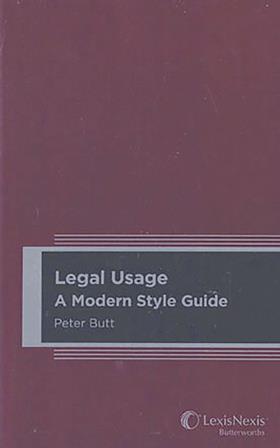Legal Usage: A Modern Style Guide
Peter Butt
£82, LexisNexis Butterworths
★★★★✩

This new reference book exists because so much legal writing is assembled from often-used but seldom-explained words and phrases. It seeks to answer these questions for most commonly used words, phrases and writing habits: ‘What does this achieve?’ and ‘Is there a better way to say it?’. It offers a guide to best usage in legal writing, in 700 pages organised dictionary-style by keyword and topic.
Readable as the entries are, this work is not designed to be read from cover to cover. So I looked up some points that often trouble lawyers (indemnify and hold harmless; represents, warrants and undertakes; material breach; wilful misconduct; consequential loss; gender-neutral language). I found entries for them all, with no trouble but the distraction of interesting and well-written entries on other points.
Each entry gave a short, clear explanation of current usage, often with examples, references for further reading, or a suggested alternative. These suggestions were logical and thought-provoking. For example, in the right context, would a promise to ‘pay for’ something be as useful as a duty ‘to indemnify’ and provoke less resistance? Illustrations from decided cases come from England, Australia and other mostly common-law jurisdictions.
The further reading is useful, since more thought and research would be needed for some of the points raised. Unlike the book reviewed above, this guide does not suggest there is always one correct answer.
In the weeks that followed, I have consulted the guide on various questions that arose in my writing and drafting work, and found some useful ideas. But this book is more selective than a legal dictionary; it focuses on problematic expressions and writing habits. If a phrase or a topic is listed here, the chances are it can be improved.
Even if I looked up every phrase that puzzled me, I would still miss many other things I had not questioned. So a better way to use the book might be to read a new entry every day, while hoping for some benevolent IT fairy to program its contents into a word-checker that would make its advice pop up whenever it was relevant to my typing. I would still need legal knowledge and skill to decide whether to follow the advice in that place and document. But my eyes would have been opened.































No comments yet